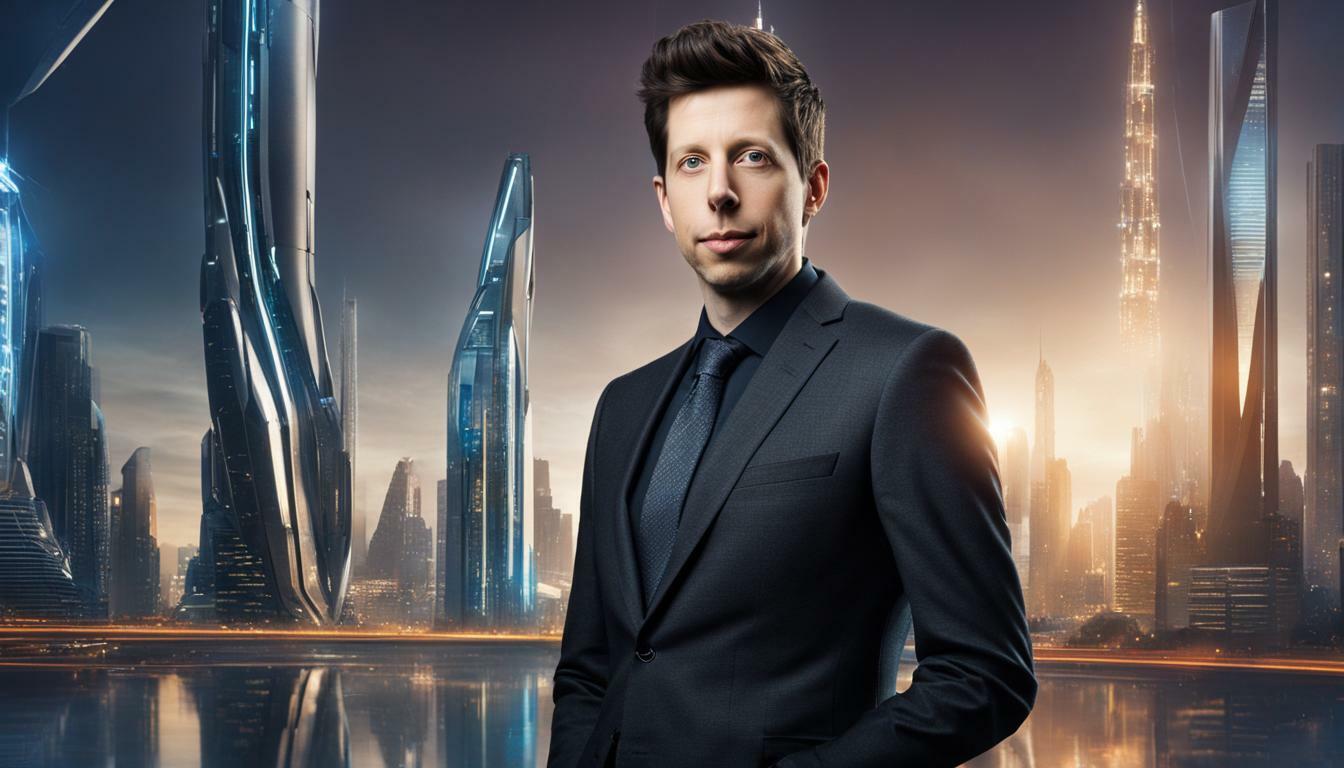Sam Altman is the current CEO of OpenAI, a prominent AI firm that he co-founded with Elon Musk. Altman’s leadership and innovative thinking have played a significant role in shaping the future of artificial intelligence.
With a background in computer science, Altman’s journey began at Stanford University. However, his entrepreneurial spirit led him to drop out and focus on developing his mobile app, Loopt. The success of Loopt paved the way for Altman to establish Hydrazine Capital, a venture fund that invested in promising startups emerging from Y Combinator, a startup accelerator.
Altman’s contributions to the tech world did not stop there. In 2014, he became the president of Y Combinator, where he shared his expertise by teaching a lecture series at Stanford titled “How to Start a Startup.” This further solidified his reputation as a trailblazer in the startup ecosystem.
In 2015, Altman co-founded OpenAI with Elon Musk, with a shared vision of ensuring the safe and beneficial development of artificial intelligence. This partnership marked a significant milestone in the advancement of AI technology.
As Altman’s passion for AI grew, he transitioned from his role as Y Combinator’s president to focus on leading OpenAI as its CEO. Under his leadership, OpenAI has undergone a transformation from a nonprofit to a “capped profit” corporation. However, Altman’s precise vision for generating revenue within this new structure remains uncertain.
OpenAI’s groundbreaking work attracted the attention of tech giant Microsoft, resulting in a $1 billion investment in 2019. Altman and the OpenAI team demonstrated their impressive AI models to Microsoft CEO Satya Nadella, solidifying OpenAI’s position as a leader in the field.
Key Takeaways:
- Sam Altman is the current CEO of OpenAI, a leading AI firm co-founded with Elon Musk.
- Altman’s journey began with the success of his mobile app, Loopt.
- He became the president of Y Combinator and taught a lecture series at Stanford titled “How to Start a Startup.”
- Altman co-founded OpenAI with Elon Musk, aiming to ensure the safe and beneficial development of AI.
- OpenAI transitioned from a nonprofit to a “capped profit” corporation.
- Microsoft’s $1 billion investment in OpenAI further solidified its position in the AI industry.
Altman has a background in computer science and dropped out of Stanford University to work on his mobile app, Loopt. This app allowed users to share their location with friends and was one of the earliest location-based social networking services. Altman’s entrepreneurial spirit led him to prioritize his startup over formal education, a decision that ultimately paid off.
After the success of Loopt, Altman founded a venture fund called Hydrazine Capital, where he invested in various promising startups. His keen eye for potential led him to become involved with Y Combinator, a renowned startup accelerator. In 2014, Altman was appointed as the president of Y Combinator, a position that allowed him to mentor and support numerous startups in their early stages.
In addition to his work at Y Combinator, Altman taught a popular lecture series at Stanford University titled “How to Start a Startup.” Through this series, he shared his experiences and insights with aspiring entrepreneurs, further solidifying his reputation as a leading figure in the startup ecosystem.
In 2015, Altman co-founded OpenAI alongside Elon Musk, with the mission of developing AI technology in a safe and beneficial manner. This collaboration marked another significant milestone in Altman’s career, propelling him into the forefront of the AI industry. His expertise and innovative mindset continue to shape OpenAI’s trajectory as they pioneer advancements in artificial intelligence.
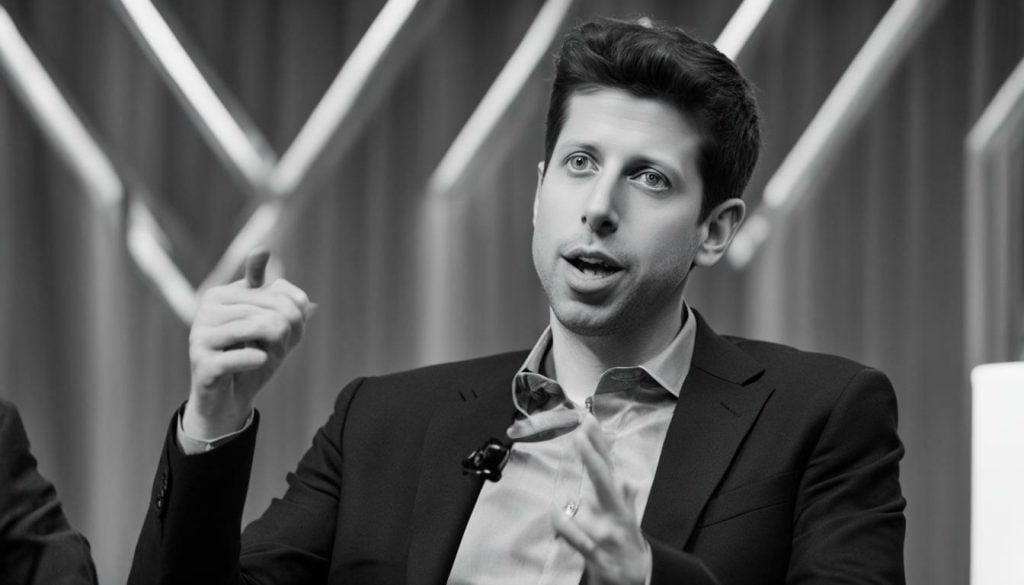
Altman’s journey from dropping out of Stanford University to becoming the CEO of OpenAI showcases his relentless pursuit of innovation and his unwavering commitment to pushing the boundaries of technology. His background in computer science, combined with his entrepreneurial accomplishments, has positioned him as a leading authority in the field of AI.
As Altman’s leadership at OpenAI drives the company forward, the future holds immense potential. While the transition from a nonprofit to a “capped profit” corporation has raised questions about the direction OpenAI will take, Altman’s vision and determination will undoubtedly shape the company’s revenue generation strategy.
With a $1 billion investment from Microsoft in 2019, OpenAI has secured the financial backing necessary to continue their groundbreaking work. Altman’s demonstration of their AI models to Microsoft CEO Satya Nadella solidified the partnership and opened up new avenues for collaboration.
| Key Achievements | Year |
|---|---|
| Became CEO of OpenAI | 2019 |
| Co-founded OpenAI with Elon Musk | 2015 |
| Served as President of Y Combinator | 2014 |
| Founded venture fund Hydrazine Capital | N/A |
Altman’s contributions to the tech world extend beyond his role at OpenAI. His involvement in the startup ecosystem and mentorship of early-stage companies have left a lasting impact on the industry. Altman’s journey serves as an inspiration to aspiring entrepreneurs and showcases the immense potential that lies within the realm of AI.
Y Combinator Presidency and Entrepreneurship
Altman became the president of Y Combinator in 2014 and taught a lecture series at Stanford called “How to Start a Startup.” His leadership at Y Combinator was instrumental in supporting and guiding numerous startups, and he became a prominent figure in the Silicon Valley startup ecosystem.
With his background in computer science, Altman brought a wealth of knowledge and experience to Y Combinator. He had previously dropped out of Stanford University to work on his mobile app, Loopt, which was eventually sold. After the sale, Altman founded a venture fund called Hydrazine Capital, where he heavily invested in Y Combinator companies, recognizing their potential for growth and innovation.
During his tenure as president, Altman focused on expanding Y Combinator’s reach and influence. He not only provided financial support to startups but also offered mentorship, guidance, and access to a vast network of investors and professionals. Altman’s passion for entrepreneurship and his belief in the power of technology to transform industries made him instrumental in shaping the success of Y Combinator and its portfolio companies.
| Key Highlights | Sam Altman |
|---|---|
| Position | President of Y Combinator |
| Role | Providing guidance and support to startups |
| Focus | Expanding Y Combinator’s reach and influence |
| Contribution | Mentorship, guidance, and access to a network of investors |
Altman’s involvement with Y Combinator not only solidified his reputation as a leader in the startup ecosystem but also laid the foundation for his partnership with Elon Musk in co-founding OpenAI. His experience in supporting and nurturing early-stage companies made him well-suited to take on the challenge of leading an AI research organization with a mission to ensure safe and beneficial AI development.
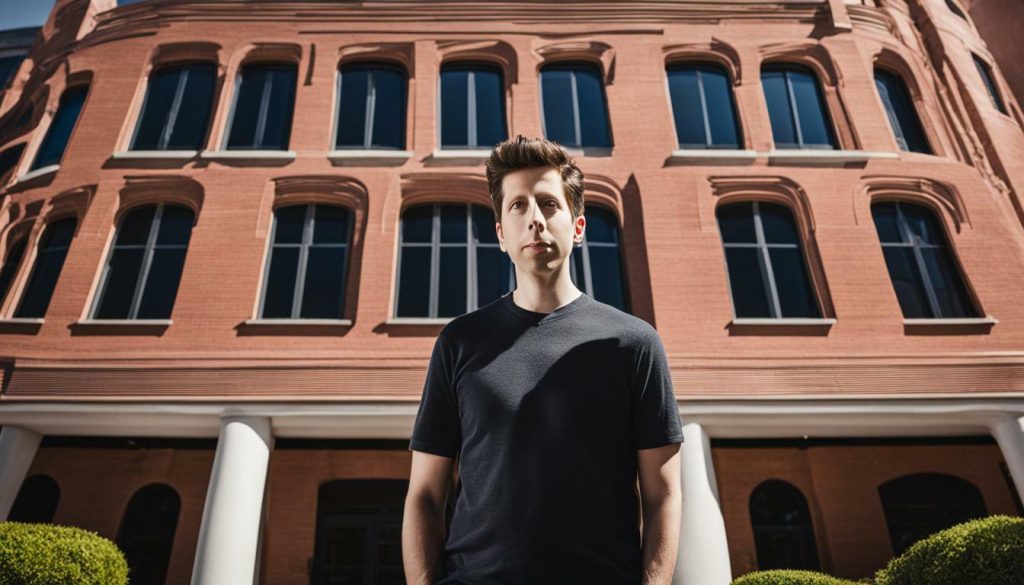
Co-founding OpenAI with Elon Musk
In 2015, Altman co-founded OpenAI with Elon Musk, with the goal of ensuring safe and beneficial AI development. This collaboration brought together two influential figures in the tech industry who shared a common vision for the future of artificial intelligence. Musk, known for his advocacy of cautious AI development, and Altman, with his expertise in entrepreneurship and technology, joined forces to create an organization dedicated to advancing AI in a responsible manner.
OpenAI aims to build artificial general intelligence (AGI) systems that are not only highly capable but also aligned with human values. AGI refers to highly autonomous systems that outperform humans in most economically valuable work. By focusing on safety, transparency, and collaboration, OpenAI aims to ensure that AGI benefits all of humanity.
Altman’s leadership at OpenAI has been instrumental in driving the company’s growth and impact in the AI field. Under his guidance, OpenAI has made significant advancements in areas such as natural language processing, reinforcement learning, and robotics.
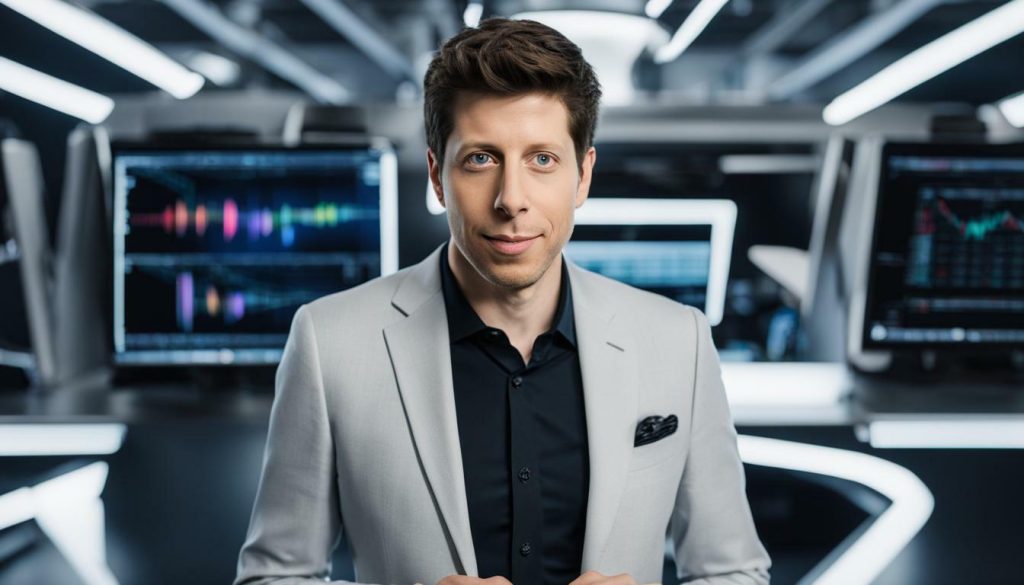
| Year | Milestone |
|---|---|
| 2015 | Co-founded OpenAI with Elon Musk |
| 2019 | Transitioned OpenAI from a nonprofit to a “capped profit” corporation |
| 2019 | Received a $1 billion investment from Microsoft |
Transition to OpenAI CEO
Altman stepped down as Y Combinator’s president in 2019 to focus on OpenAI, where he became CEO. His transition to leading OpenAI marked a critical milestone in his career, as he shifted his focus from nurturing startups to spearheading the development of advanced artificial intelligence technologies.
With his extensive experience in the startup ecosystem and his deep understanding of AI, Altman was the ideal candidate to take the helm at OpenAI. As CEO, he has been instrumental in driving OpenAI’s mission to ensure safe and beneficial AI development for the benefit of all.
Under Altman’s leadership, OpenAI has made significant strides in the field of AI, with groundbreaking research and the development of state-of-the-art models. His vision for OpenAI’s future is driven by a commitment to ethical AI advancement and the pursuit of cutting-edge technological innovations.

Impact of Altman’s Leadership at OpenAI
Altman’s leadership at OpenAI has had a profound impact on the organization’s growth and the wider field of AI. Through his strategic guidance, OpenAI has attracted top talent and forged partnerships with industry-leading companies.
| Key Achievements | Impact |
|---|---|
| Development of advanced AI models | OpenAI has become a pioneer in the development of state-of-the-art AI models, pushing the boundaries of what is possible in the field. |
| Expansion of research capabilities | Under Altman’s leadership, OpenAI has grown its research team, enabling the organization to tackle complex AI challenges and drive innovation. |
| Strategic partnerships | Altman’s leadership has facilitated collaborations with industry giants like Microsoft, enabling OpenAI to leverage resources and expertise for continued growth and impact. |
Altman’s contributions to OpenAI and the tech world at large have solidified his reputation as a visionary leader and innovator. With his relentless pursuit of safe and ethical AI development, Altman continues to shape the future of artificial intelligence.
OpenAI’s Corporate Structure
OpenAI transitioned from a nonprofit to a “capped profit” corporation, but Altman’s vision for revenue generation is still uncertain. This shift in corporate structure reflects OpenAI’s evolving approach to AI research and development. As a “capped profit” corporation, OpenAI aims to strike a balance between pursuing its mission of AI advancement and generating sustainable financial returns.
This new structure allows OpenAI to allocate resources and pursue strategic partnerships that can propel its research forward while ensuring responsible AI development. By engaging in commercial activities, OpenAI can secure the necessary funding to support its ambitious initiatives. However, Altman’s vision for revenue generation remains an open question, as OpenAI continues to explore different avenues for monetization while keeping its commitment to the ethical and beneficial use of artificial intelligence.

Altman’s leadership at OpenAI has sparked discussions and debates within the AI community on the implications of transitioning from a nonprofit to a “capped profit” corporation. While some believe the shift may compromise OpenAI’s original mission of democratizing AI, others see it as a necessary step to ensure long-term sustainability and impact. The true impact of this corporate structure change on OpenAI’s work and its ability to deliver on its promise remains to be seen.
In the quest for responsible AI development, OpenAI’s commitment to transparency and cooperation is evident. By collaborating with industry leaders like Microsoft, OpenAI aims to tackle complex challenges and accelerate AI breakthroughs. This strategic partnership with Microsoft, including the significant investment received, further solidifies OpenAI’s position as a leading force in the AI landscape.
OpenAI’s Corporate Structure Table
| Corporate Structure | Description |
|---|---|
| Previous Structure | Nonprofit organization |
| Current Structure | “Capped profit” corporation |
| Vision | Ensuring responsible AI development |
| Revenue Generation | Uncertain; exploring different monetization avenues |
| Strategic Partnership | Significant investment from Microsoft |
Microsoft Investment in OpenAI
OpenAI received a $1 billion investment from Microsoft in 2019, following a demonstration of their AI models to Microsoft CEO Satya Nadella. This strategic investment marked a significant milestone for OpenAI and highlighted the growing importance of AI in the tech industry. The partnership between Microsoft and OpenAI aims to accelerate the development of artificial general intelligence (AGI) and foster responsible and ethical AI practices.
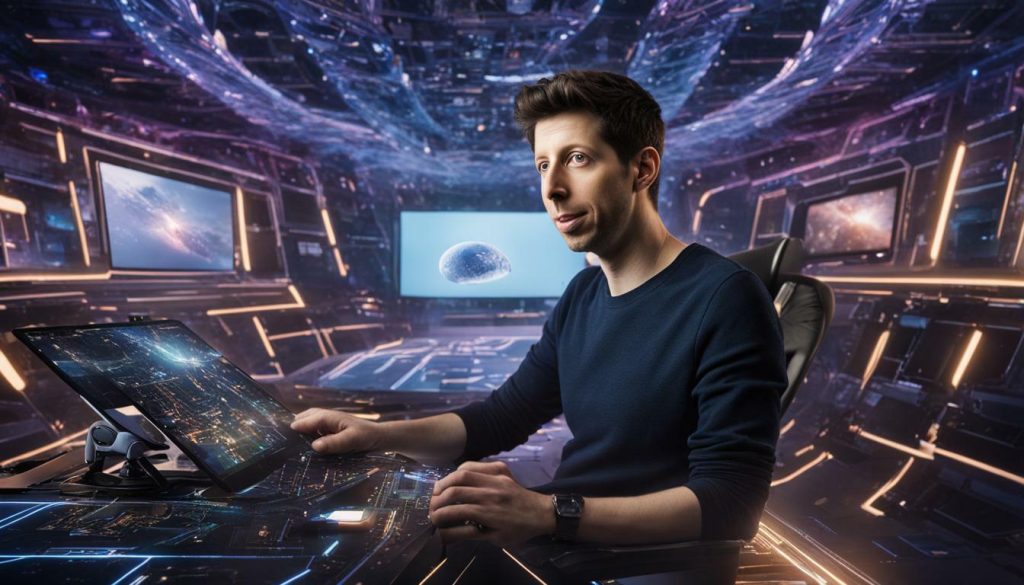
With Microsoft’s investment, OpenAI gains access to crucial resources and capabilities that will enable them to scale their operations and unleash the full potential of AGI. This collaboration also aligns with Microsoft’s commitment to advancing AI research and its application in various domains.
The $1 billion investment further solidifies OpenAI’s position as a leading player in the AI industry, and it underscores the confidence that industry giants like Microsoft have in the company’s vision and capabilities. This investment enables OpenAI to continue pushing the boundaries of AI technology and drive innovation at an unprecedented pace.
As OpenAI and Microsoft join forces, their combined expertise and resources have the potential to shape the future of AI and revolutionize various industries. The collaboration between these two powerhouse companies sets the stage for groundbreaking advancements in AI research, development, and deployment.
Impact of Altman’s Leadership at OpenAI
Altman’s leadership has fueled OpenAI’s growth and contributed to its advancements in the field of AI. Under Altman’s guidance, OpenAI has forged ahead as a leader in cutting-edge AI research and development, making significant strides in areas such as natural language processing, computer vision, and reinforcement learning.
One of the key achievements during Altman’s tenure as CEO is OpenAI’s groundbreaking development of the GPT-3 language model. GPT-3, with its impressive capacity for natural language understanding and generation, has reshaped the possibilities for human-AI interaction and has been utilized in various applications, ranging from chatbots to content creation.
In addition to driving technological advancements, Altman has been instrumental in establishing strategic partnerships to further OpenAI’s mission. The $1 billion investment from Microsoft, secured under his leadership, has provided the necessary resources and support for OpenAI to continue pushing boundaries in AI research and development. This investment further validates the significance of OpenAI’s work in the eyes of industry leaders.
| Key Achievements: | Highlights: |
|---|---|
| GPT-3 Development | Revolutionizing natural language processing and human-AI interaction. |
| Strategic Partnership with Microsoft | Securing a $1 billion investment to support OpenAI’s mission. |
Altman’s visionary leadership has also had a profound impact on OpenAI’s organizational culture. He has fostered an environment that encourages collaboration, innovation, and a strong sense of purpose among team members. OpenAI has become known for its commitment to ethical AI development, ensuring that the technology is designed with safety and societal impact in mind.
“Our goal is to ensure that artificial general intelligence benefits all of humanity. We are committed to conducting research and building AI systems that are safe, transparent, and aligned with human values,”
With Altman at the helm, OpenAI is poised to continue pushing the boundaries of AI technology, while also prioritizing the ethical considerations that come with such advancements. His leadership has positioned OpenAI as a leading force in shaping the future of AI and has set the stage for even greater achievements to come.
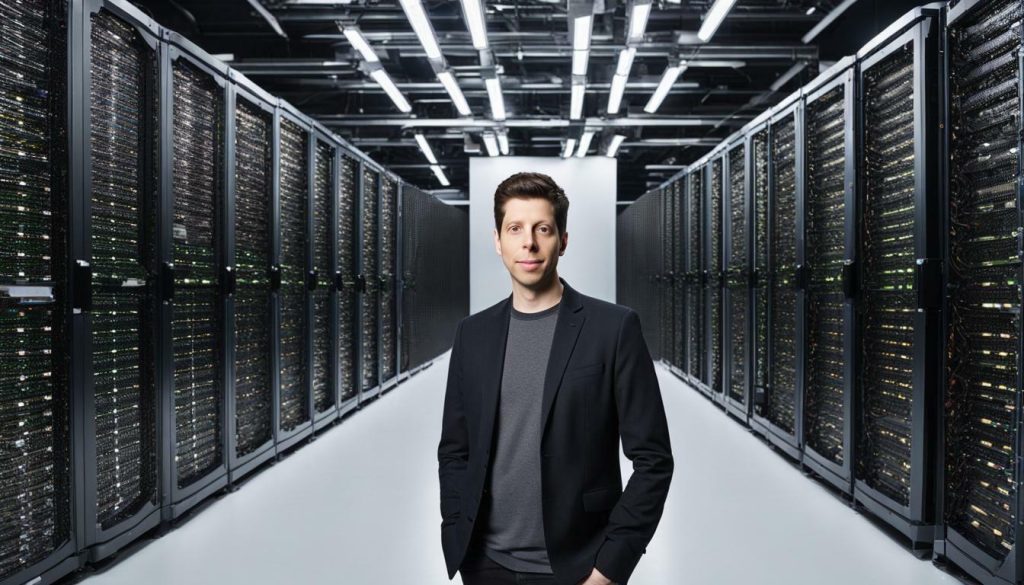
Under Altman’s leadership, OpenAI is poised for future innovations and developments in the field of AI. The company’s mission to ensure safe and beneficial AI development remains at the forefront of their endeavors. With Altman’s expertise and vision, OpenAI is set to push the boundaries of artificial intelligence and contribute significantly to the tech world.
The transition of OpenAI from a nonprofit organization to a “capped profit” corporation reflects Altman’s strategic approach to revenue generation. While the specific plans for generating profit are still uncertain, this shift allows OpenAI to leverage its cutting-edge AI technologies for sustainable growth and impact.
One key milestone in OpenAI’s journey was the $1 billion investment received from Microsoft in 2019. This substantial investment demonstrates the industry’s recognition of OpenAI’s potential and the confidence in Altman’s leadership. The partnership with Microsoft opens up new avenues for collaboration, research, and development, further bolstering OpenAI’s position as a pioneer in AI.
| Key Points: |
|---|
| Altman’s leadership drives future innovations in AI at OpenAI |
| Transition from nonprofit to “capped profit” corporation for sustainable growth |
| $1 billion investment from Microsoft validates OpenAI’s potential |
With ongoing advancements in AI, OpenAI under Altman’s guidance is expected to make significant contributions to the tech world. The company’s focus on ethical and responsible AI practices ensures that developments in the field align with societal needs and values. Altman’s leadership, combined with the talented team at OpenAI, places the company in a unique position to shape the future of AI and drive innovation across various industries.

As the world continues to embrace the possibilities of AI, OpenAI, under the leadership of Sam Altman, remains at the forefront of this transformative technology. With a commitment to responsible AI development, innovative research, and strategic partnerships, OpenAI is well-positioned to shape the future of AI and make a lasting impact on society.
Contributions to the Tech World
Altman’s contributions to the tech world extend beyond OpenAI, encompassing his involvement in the startup ecosystem and his role in fostering innovation. As the former president of Y Combinator, Altman played a pivotal role in nurturing and mentoring numerous startups, providing them with the resources and guidance needed to succeed. Through Y Combinator’s renowned accelerator program, Altman helped launch iconic companies such as Airbnb, Dropbox, and Reddit, shaping the future of the tech industry.
Altman’s dedication to fostering innovation is evident in his efforts to educate and inspire aspiring entrepreneurs. In 2014, he taught a lecture series at Stanford University called “How to Start a Startup,” which became widely popular and continues to serve as a valuable resource for entrepreneurs worldwide. Through his lectures, Altman shared valuable insights and advice on building successful startups, offering practical wisdom to those looking to make their mark in the tech world.
The most successful companies are the ones that solve problems for a lot of people. Focus on building something that people truly need and find innovative ways to address their pain points.” – Sam Altman
In addition to his role at Y Combinator, Altman founded Hydrazine Capital, a venture fund that invested in promising startups. With his keen eye for identifying disruptive technologies, Altman backed numerous companies that transformed industries and revolutionized the way we live today. His investments have spanned a wide range of sectors, including healthcare, transportation, and artificial intelligence, further solidifying his status as a visionary leader in the tech community.
| Startups Supported by Sam Altman | Industry |
|---|---|
| Stripe | Financial Technology |
| Cruise | Autonomous Vehicles |
| Instacart | Grocery Delivery |
| DoorDash | Food Delivery |
Altman’s relentless pursuit of innovation and his commitment to supporting the next generation of tech leaders have made him a highly influential figure in the industry. Through his various endeavors, Altman continues to shape the tech landscape, leaving an indelible mark on the world of entrepreneurship.
Conclusion
Sam Altman’s journey as the current CEO of OpenAI showcases his innovation and leadership in the field of AI. With a background in computer science and a track record of successful entrepreneurship, Altman has made significant contributions to the tech world.
Starting with his early career, Altman dropped out of Stanford University to pursue his passion for technology, eventually founding the mobile app Loopt. After the sale of Loopt, he founded the venture fund Hydrazine Capital and became heavily involved in supporting startups through his role as the president of Y Combinator.
In 2015, Altman co-founded OpenAI with Elon Musk, aiming to ensure safe and beneficial AI development. Under his leadership, OpenAI transitioned from a nonprofit to a “capped profit” corporation, with the goal of generating revenue that remains uncertain. However, Altman’s vision and dedication to advancing AI technology have been unwavering.
OpenAI’s partnership with Microsoft, which resulted in a $1 billion investment, further solidifies Altman’s influence in the industry. This collaboration demonstrates the recognition and trust placed in Altman’s leadership and his ability to drive OpenAI’s mission forward.
Sam Altman – current CEO of OpenAI
FAQ
Who is Sam Altman?
Sam Altman is the current CEO of OpenAI, a prominent AI firm co-founded by Elon Musk. He is also well-known in Silicon Valley as the former president of startup accelerator Y Combinator.
What is Sam Altman’s background?
Sam Altman has a background in computer science and dropped out of Stanford University to work on his mobile app, Loopt. After the sale of Loopt, Altman founded a venture fund called Hydrazine Capital and heavily invested in Y Combinator companies.
What role did Sam Altman play in Y Combinator?
Sam Altman became the president of Y Combinator in 2014. He also taught a lecture series at Stanford called “How to Start a Startup.”
What is Sam Altman’s involvement with OpenAI?
In 2015, Sam Altman co-founded OpenAI with Elon Musk. The goal of OpenAI is to ensure safe and beneficial AI development.
When did Sam Altman become CEO of OpenAI?
Sam Altman became the CEO of OpenAI after stepping down as Y Combinator’s president in 2019, to focus on OpenAI.
What is OpenAI’s corporate structure?
OpenAI transitioned from a nonprofit to a “capped profit” corporation. However, Altman’s vision for revenue generation is still uncertain.
Did OpenAI receive any significant investments?
Yes, OpenAI received a $1 billion investment from Microsoft in 2019, following a demonstration of their AI models to Microsoft CEO Satya Nadella.
What is the impact of Sam Altman’s leadership at OpenAI?
Sam Altman’s leadership has contributed to OpenAI’s growth and advancements in the field of AI.
What is the future outlook for OpenAI under Sam Altman’s leadership?
The future outlook for OpenAI under Sam Altman’s leadership holds promise for further innovations and developments in AI.
What are Sam Altman’s contributions to the tech world?
Sam Altman has made significant contributions to the tech world through his role at OpenAI and his involvement in the startup ecosystem.

